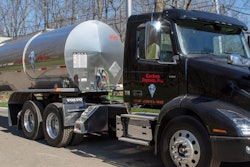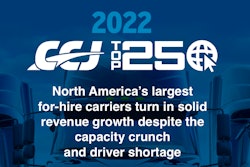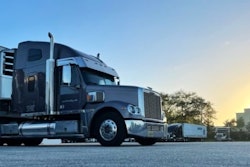U.S. Xpress (CCJ Top 250 No. 19) announced on Wednesday a significant business overhaul that includes layoffs and rolling its once-lauded Variant subsidiary into its larger over-the-road operations segment as the fleet admits defeat on the technology-driven experiment and shuts down its Atlanta headquarters.
With the goal of decreasing driver turnover and boosting freight efficiency, Variant leaned heavily on a route planning program the company developed called Optimizer. However, the tech platform ultimately delivered results mostly to the contrary.
"The big thing is utility. We saw a big drop in our utility," U.S. Xpress President & CEO Eric Fuller said on a call with investors Thursday, adding the drop in utilization resulted in "drivers making less money" and increased driver turnover.
For now, the company will return its focus to keeping trucks moving.
"A lot of things from a tech standpoint were designed around driving utility and, for a number of reasons, those strategies were not successful. So we're getting back to the basics from a utility standpoint," Fuller said.
Asked point blank if Variant was "dead," Fuller said not entirely, adding the brand retains a lot of value and technology, but the "startup strategy where there was a lot being thrown against the wall" had to end, and that the company will return to a more targeted approach.
"Our vision to build a digitally enabled OTR fleet was ambitious and achieved certain successes, but with the freight market softening, it is important that we right size our cost structure for the current environment to protect our corporate health, our commitments to our customers and our stockholders’ investment," Fuller said.
Overall, the move represents an about-face for a company that saw its stock jump 29% in July 2020 after reporting a strong quarter and giving an optimistic outlook about Variant's Optimizer technology. Barely a year later the division was struggling and in late 2021 Variant President Cameron Ramsdell was terminated. By 2022 driver turnover at Variant exceeded 100%.
“Two things became apparent to me over the first two quarters of the year," said Fuller. "First, we built some really advanced technology to deploy across the company. Second, the technology still can’t replace all the knowledge and experience of our people, so they need to work together."
The company also terminated a lease on Variant's Atlanta headquarters as it begins "to rationalize our real estate footprint as a result of our workforce reduction and remote workforce." Terminating the lease will cost the company $1.2 million, but it anticipates saving $2 million annually on the property starting late this year.
The Chattanooga, Tennessee-based fleet will now feature just two divisions: Dedicated and Highway Services, the latter of which will include OTR, Variant and the company's brokerage operations, and will report to Justin Harness, who formerly led the Dedicated division. Brandon Danneffel, former Senior Vice President of Brokerage, will replace Harness as the President of Dedicated.
"Justin led the turnaround of our Dedicated division over the last year and a half and will assume overall responsibility for the newly created Highway Services division. We believe Brandon’s experience will be invaluable in the Dedicated division, where strong performance requires close partnerships with customers. The priorities of our Dedicated and Brokerage businesses will not change with today's announcement," Fuller continued.
Additionally, the realignment plan includes "eliminating organizational overlaps and duplicative functions" as part of a "workforce reduction initiative."
"This decision, though difficult, was necessary to right size our our cost structure to current anticipated revenue levels and market conditions," Fuller said on a call on Thursday. "The first half of this year has been extremely difficult, but we believe a realignment plan will position the company for better times ahead."
The workforce reduction initiative "was primarily concentrated in our technology organization and other back office administrative roles," U.S. Xpress CFO Eric Peterson said on the call. He described the layoffs as "removing duplicative costs as we consolidated our corporate IT functions with our technology teams in both Variant and Xpress technologies."
Peterson also said the company would stop all work on projects unlikely to have a "near term" result, and that a it will lead to a "leaner technology team focused on high productivity projects."
Finally, the company will target a "more conservative approach to our fleet trade cycle," according to Peterson, by running tractors an additional 100,000 miles, which will likely bump up the fleet's average tractor age from 22 to 27 months with a "minimal" impact on maintenance costs, according to Peterson.
Combined with other cost-cutting measures, Peterson said the company expects to save about $25 million, beginning in Q4.










